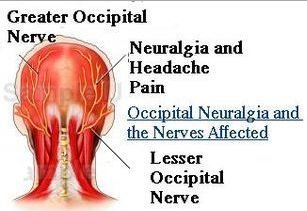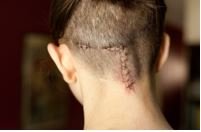Occipital Neuralgia
What is occipital neuralgia?
Occipital nerve is associated with the occipital lobe of the brain, which is situated at the back and top of the head. Occipital neuralgia is a pain disorder related to the occipital nerve. Severe pain is felt at the backside of the head and gradually extends up to back of the neck. The pain features are similar to migraine, so the chance of faulty diagnosis is more.
In occipital neuralgia, the specific feature is excessive spontaneous needle pricking at the backside of the scalp followed by negative sensation or numbness. Two nerve roots; C2 and C3 are mainly affected in, Occipital neuralgia. Compression of these nerve roots often causes Occipital neuralgia.

Image 1: Anatomical Description of Occipital Neuralgia
Symptoms
The common symptoms arise in occipital neuralgia are:
- Sharp headache. Initially throbbing felt on both sides of the head and gradually the pain extends at the back of the neck and up the head to the scalp.
- Irritable sensation
- Prickling
- Numbness

Image 2: Head pain in occipital neuralgia
Rolling of neck (or neck movement) and extension of the neck may provoke pain.
- Weakness
- Posterior scalp paresthesias (pinning or tingling sensation at the back of the skull)
- photophobia
- Dizziness
- Often occipital neuralgia followed a series which occurs as a pain-spasm-pain.
- Paralysis
The duration of pain and associated symptoms which are developed in occipital neuralgia is variable; it may stay for hours to several days. It depends upon individual to individual and also surrounding environments.
Causes
It is not always necessary that the development of some disorder leads to occipital neuralgia; the evidence showed that many of the incidences happened spontaneously. Other possible causes of development of occipital neuralgia are:
- Arthritis can cause compression of the occipital nerve root in the neck, which leads to occipital neuralgia.
- Head Injury
- Accidental trauma in skull
- Prior brain surgery
- Muscle tightening at the backside of the skull can cause entrapping of the cranium nerves and leads occipital neuralgia.
- Degenerative diseases in cervical spine, which occurs in spondylosis, arthritis where the upper cervical facet joints are modified and attached ligaments become thickened and occipital nerve deterioration.
- Development of tumour in the occipital nerve
- Other potential reasons include occipital lobe oriented infections or tenderness, diabetes, gout and blood vessel swelling.
Treatment
Treatment of occipital neuralgia is divided into two segments:
- Non pharmacological therapy
- Pharmacological or medical therapy
Non Pharmacological Therapy
The following non pharmacological therapies may effective for acute attack:
- Physical therapy
- Acupuncture
- Massage and
- Heat compression
Pharmacological Therapy
Pharmacological Therapies need recommendation from doctor. Following are some pharmacological therapies:
Medications
The following medications are beneficial for relieving pain in occipital neuralgia:
- Gabapentin,
- Valproic acid
- Phenytoin
- Carbamazepine
- Baclofen
- NSAIDs and
- Opioids
Nerve Blocking
The involved nerves for occipital neuralgia are occipital nerve and C2 & C3 nerve.
- Occipital nerve block mainly obtained by the greater and third occipital nerve blockage which is an effective pain reducing technique for occipital neuralgia. The blockage is obtained by injecting a combination therapy of local anaesthetic and steroid at medial to the occipital artery. The onset of action is started within 10 to 20 minutes. Precaution should be taken to avoid shooting the occipital artery and bleed. This is an effective treatment.
- Blocking of C2 and/or C3 nerve and ganglion blockage is effective for management of severe pain. This treatment gives more than 2 months relieve from pain associated with occipital neuralgia. Frequent repetition of this therapy is not recommended as long term use of steroidal drugs having great side effects.
Botulinum Toxin
Botox (Botulinum Toxin Type A) is effective for management of chronic headache. It can lessen the severity, duration, frequency and intake of medicine by controlling the headache. Clinical trials showed Botox is effective to treat a whiplash-associated disorder which is one of the causative reasons for the development of occipital neuralgia. Administration of the Botox can control the headache incidence up to 4 months of the time period. The evidence showed that administration Botox is safe and well-tolerated. The enlisted side effects are minimal including mild discomfort or bleeding at the instance of the injection.
Radiofrequency Thermocoagulation
Newly advanced technique for treating occipital neuralgia is Radiofrequency thermocoagulation (RF). It has a wide range of benefits which provides relatively low risk association, effective treatment, quick recovery and no scar marks. Radiofrequency thermocoagulation is applied for C2 ganglionotomy which is considered as another treatment option for occipital neuralgia is Pulsed radiofrequency (PRF). Proper follow up is important for reduction of reoccurrence.
Surgery
Sporadically micro vascular nerve decompression can be a treatment option for occipital neuralgia. Different surgical processes which are effective for treatment of occipital neuralgia include

Image 3: Surgery in occipital neuralgia
- Epifacial electric stimulation
- neurolysis of the greater occipital nerve,
- dorsal cervical rhizotomy
- radiofrequency rhizotomy and
- Selective C2 and/or C3 dorsal rhizotomy ( but evidence based treatment support is less than the others)
- Currently, a new surgical procedure was invented consisting of the greater occipital nerve neurolysis and surgery of the inferior oblique muscle.
References
- http://www.webmd.com/migraines-headaches/occipital-neuralgia-symptoms-causes-treatments
- http://www.hopkinsmedicine.org/neurology_neurosurgery/centers_clinics/headache/conditions/occipital_neuralgia.html
- What is occipital neuralgia? Symptoms, causes, Treatment at http://www.healthgrades.com/conditions/occipital-neuralgia
- http://www.gloshospitals.nhs.uk/SharePoint19/Chronic%20and%20Acute%20Pain%20Services%20Web%20Documents/Occipitalneuralgia.pdf
